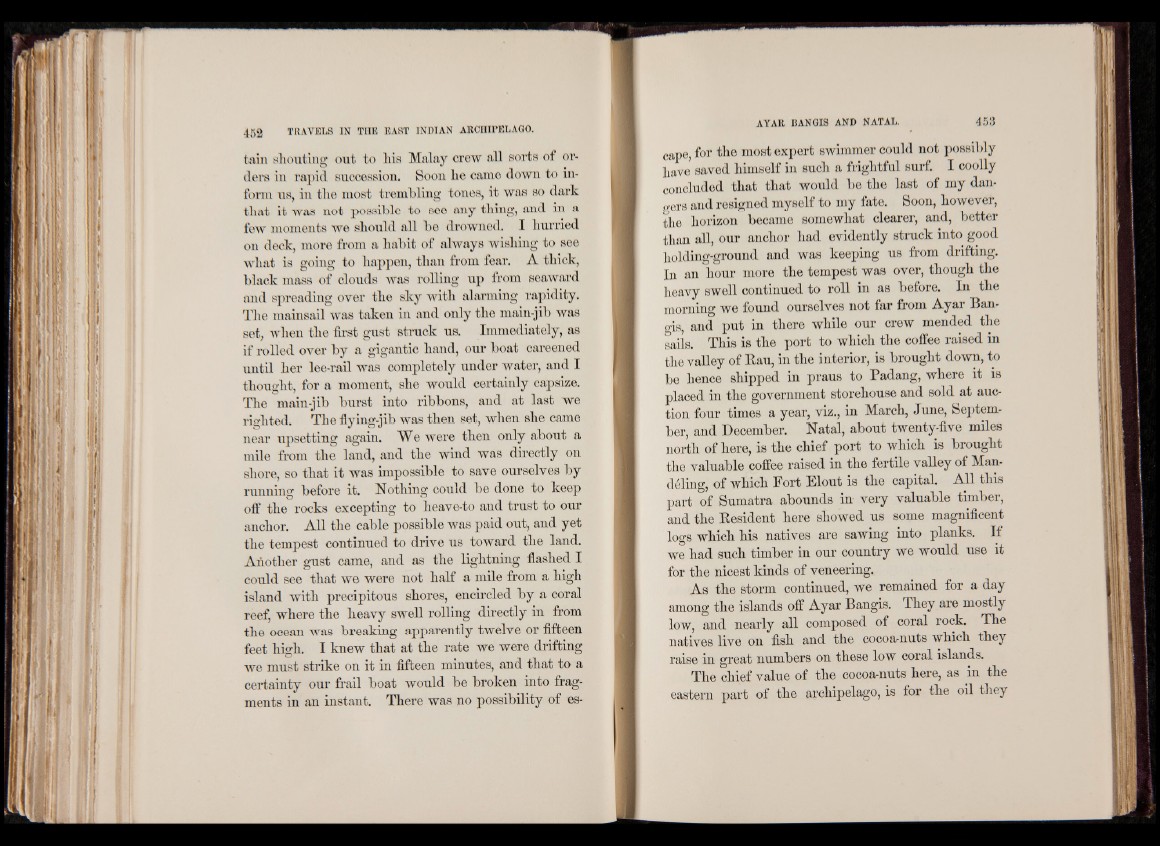
tain shouting out to his Malay crew all sorts of orders
in rapid succession. Soon he came down to inform
us, in the most trembling tones, it was so dark
that it was not possible to see any thing, and in a
few moments we should all be drowned. I hurried
on deck, more from a habit of always wishing to see
what is going to happen, than from fear. A thick,
black mass of clouds was rolling up from seaward
and spreading over the sky with alarming rapidity.
The mainsail was taken in and only the main-jib was
set, when the first gust struck us. Immediately, as
if rolled oyer by a gigantic hand, our boat careened
until her lee-rail was completely under water, and I
thought, for a moment, she would certainly capsize.
The main-jib burst into ribbons, and at last we
righted. The flying-jib was then set, when she came
near upsetting again. We were then only about a
mile from the land, and the wind was directly on
shore, so that it was impossible to save ourselves by
running before it. Nothing could be done to keep
off the rocks excepting to heave-to and trust to our
anchor. All the cable possible was paid out, and yet
the tempest continued to drive us toward the land.
Another gust came, and as the lightning flashed I
could see that we were not half a mile from a high
island with precipitous shores, encircled by a coral
reef, where the heavy swell rolling directly in from
the ocean was breaking apparently twelve or fifteen
feet hiirh. I knew that at the rate we were drifting
we must strike on it in fifteen minutes, and that to a
certainty our frail boat would be broken into fragments
in an instant. There was no possibility of escape,
for the most expert swimmer could not possibly
have saved himself in such a frightful surf. I coolly
concluded that that would be the last of my dangers
and resigned myself to my fate. Soon, however,
the horizon became somewhat clearer, and, better
than all, our anchor had evidently struck into good
holding-ground and was keeping us from drifting.
In an hour more the tempest was over, though the
heavy swell continued to roll in as before. In the
morning we found ourselves not far from Ayar Ban-
gis, and put in there while our crew mended the
sails. This is the port to which the coffee raised in
the valley of Rau, in the interior, is brought down, to
be hence shipped in praus to Padang, where it is
placed in the government storehouse and sold at auction
four times a year, viz., in March, June, September,
and December. Natal, about twenty-five miles
north of here, is the chief port to which is brought
the valuable coffee raised in the fertile valley of Man-
doling, of which Fort Elout is the capital. All this
part of Sumatra abounds in very valuable timber,
and the Resident here showed us some magnificent
logs which his natives are sawing into planks. If
we had such timber in our country we would use it
for the nicest kinds of veneering.
As the storm continued, we remained for a day
among the islands off Ayar Bangis. They are mostly
low, and nearly all composed of coral rock. The
natives live on fish and the cocoa-nuts which they
raise in great numbers on these low coral islands.
The chief value of the cocoa-nuts here, as in the
eastern part of the archipelago, is for the oil they